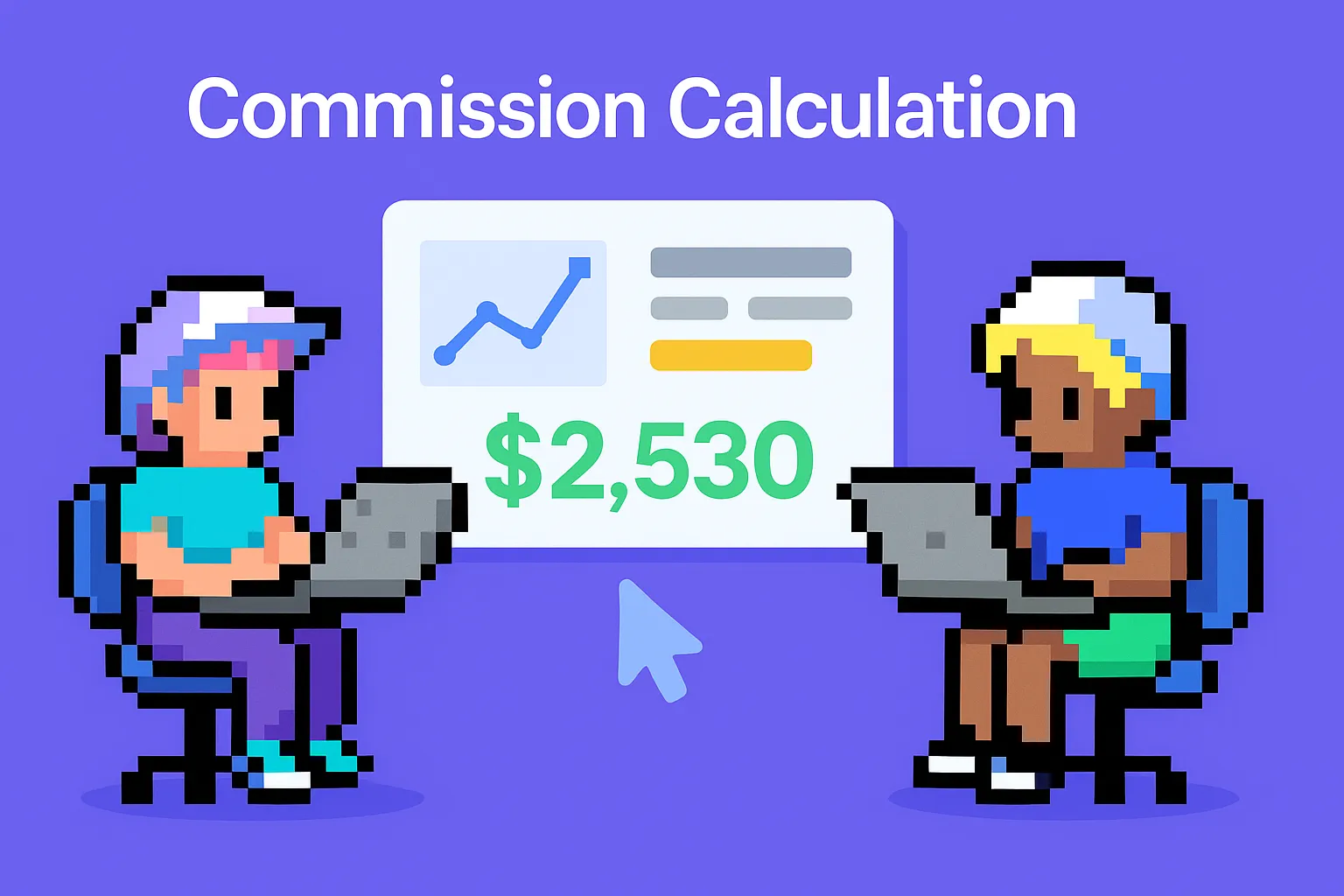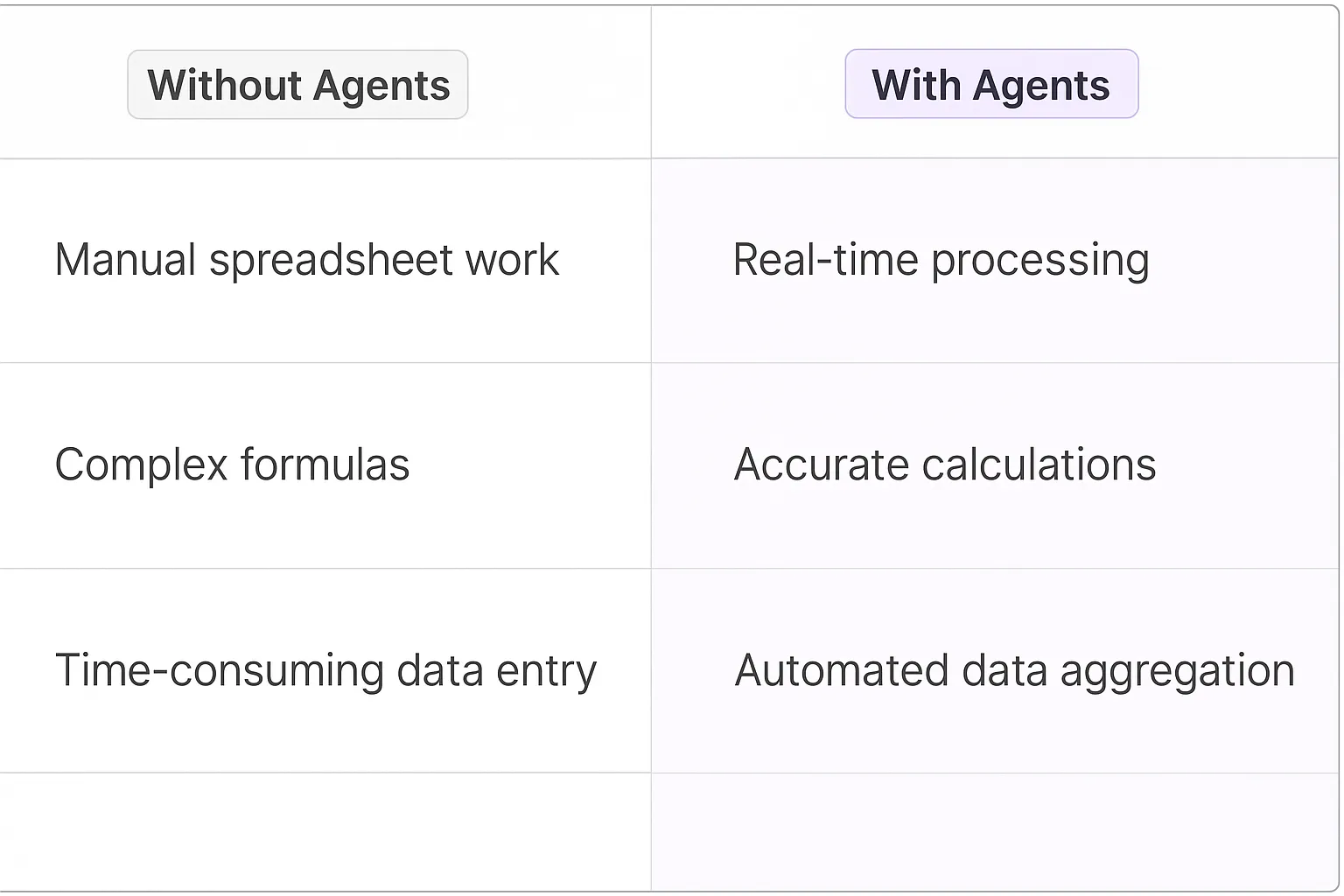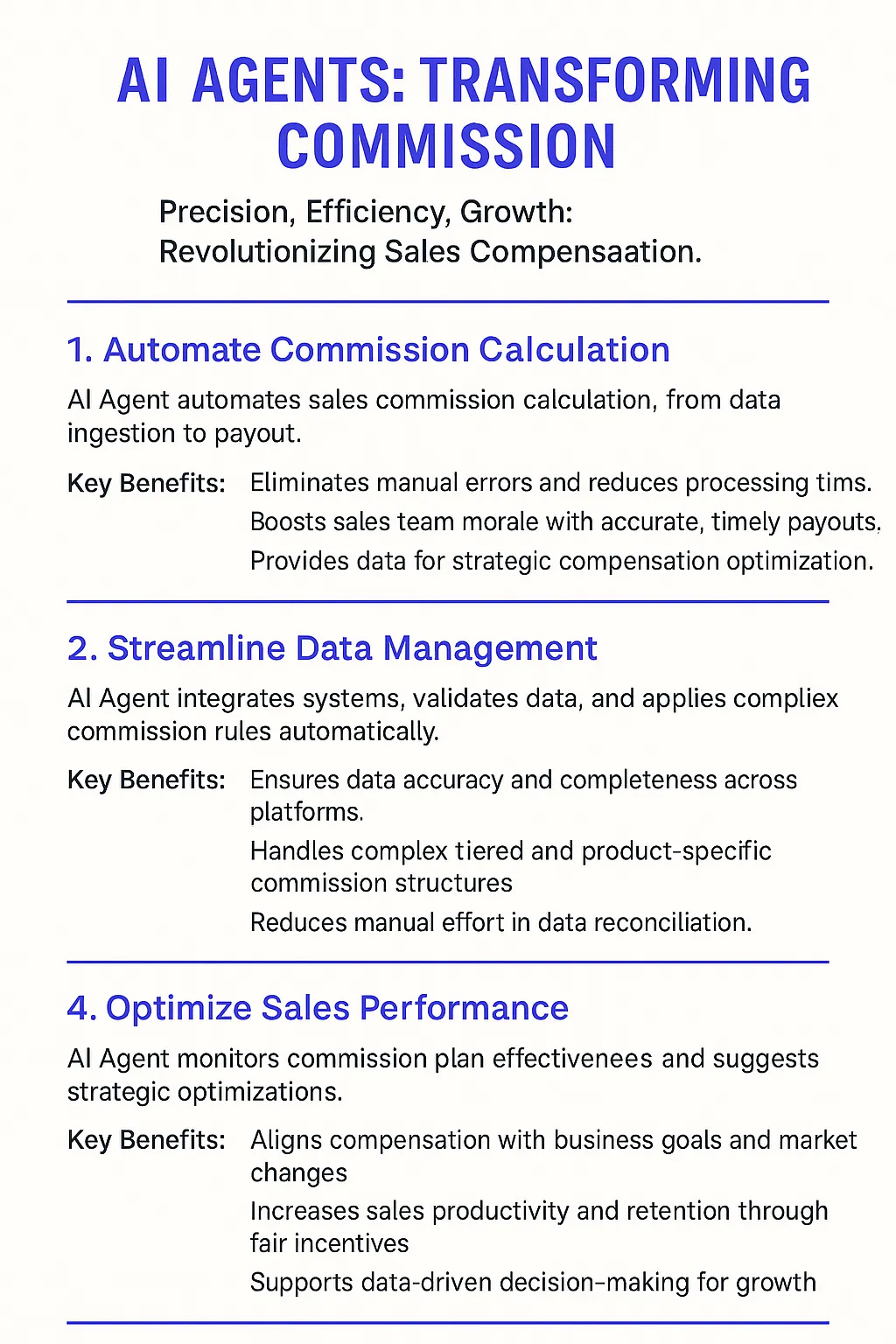Commission Calculation AI Agents
The Evolution of Commission Calculation with AI Agents
What is Commission Calculation?
Commission calculation is the process of determining the compensation owed to sales representatives based on their performance. It involves analyzing sales data, applying various commission structures, and accurately computing payouts. Traditionally a complex and time-consuming task, commission calculation is crucial for motivating sales teams and ensuring fair compensation.
Key Features of Commission Calculation
AI-powered commission calculation brings several game-changing features to the table. It offers real-time processing of vast amounts of data, handling complex commission structures with ease. The system adapts quickly to changes in compensation models, provides transparent breakdowns of calculations, and integrates seamlessly with existing sales and finance systems. Perhaps most importantly, it learns and improves over time, continuously refining its accuracy and efficiency.

Benefits of AI Agents for Commission Calculation
What would have been used before AI Agents?
Before AI agents entered the scene, commission calculation was a tedious, error-prone process that often involved spreadsheets, manual data entry, and complex formulas. Sales teams would spend hours poring over transaction data, applying intricate commission structures, and double-checking their math. It was like trying to solve a Rubik's cube blindfolded while riding a unicycle – possible, but incredibly inefficient and frustrating.
Companies relied on dedicated finance personnel or specialized software that required constant updates and maintenance. These solutions were often rigid, unable to adapt quickly to changing commission structures or handle the nuances of complex sales scenarios. The result? Delayed payouts, disputes over calculations, and a general sense of mistrust in the system.
What are the benefits of AI Agents?
Enter AI agents for commission calculation, and suddenly we're playing a whole new ballgame. These digital teammates are like having a team of math geniuses working 24/7, but without the need for coffee breaks or ergonomic keyboards.
First off, accuracy goes through the roof. AI agents can process vast amounts of data with precision that would make a Swiss watchmaker jealous. They can handle complex commission structures, tiered systems, and even those weird edge cases that used to give your finance team nightmares.
Speed is another game-changer. What used to take days or weeks can now be done in minutes or seconds. This means sales reps get their commission reports faster, leading to higher motivation and trust in the system. It's like injecting nitrous oxide into your sales team's motivation engine.
But here's where it gets really interesting: adaptability. AI agents can learn and adjust on the fly. Change your commission structure? No problem. Introduce a new product line with a different payout system? Easy peasy. The AI adapts without breaking a sweat, ensuring your commission calculations are always up-to-date and accurate.
Perhaps the most underrated benefit is the reduction in human error and bias. AI agents don't play favorites, they don't have "off days," and they certainly don't make mistakes because they were up late binge-watching the latest Netflix series. This level of consistency builds trust and transparency in your sales organization.
Lastly, these AI agents free up your human talent to focus on high-value tasks. Instead of crunching numbers, your finance team can analyze trends, optimize commission structures, and contribute to strategic decision-making. It's like upgrading from a calculator to a strategic advisor.
In the end, AI agents for commission calculation aren't just a tool – they're a competitive advantage. They're the difference between a sales team that's motivated and one that's constantly questioning their paychecks. In the high-stakes world of sales, that's a difference that can make or break a company's growth trajectory.

Potential Use Cases of AI Agents for Commission Calculation
Processes
Commission calculation is a critical yet often complex process for sales-driven organizations. AI agents can transform this task from a headache-inducing chore into a smooth, efficient operation. These digital teammates excel at handling intricate calculations, adapting to various commission structures, and processing large volumes of data with precision.
By leveraging AI for commission calculations, companies can create a more transparent, accurate, and timely compensation system. This not only boosts sales team morale but also aligns incentives more closely with organizational goals. The ripple effects of this improved process can be felt across the entire sales ecosystem, from individual reps to C-suite executives.
Tasks
- Automated data aggregation from multiple sources (CRM, ERP, billing systems)
- Real-time commission calculations based on complex, multi-tiered structures
- Proactive identification and flagging of calculation anomalies or errors
- Generation of detailed commission reports for individual sales reps and management
- Forecasting of future commissions based on pipeline and historical data
- Integration of commission data with payroll systems for seamless processing
- Scenario modeling for proposed changes to commission structures
- Compliance checks to ensure adherence to company policies and regulations
The beauty of AI-driven commission calculation lies in its ability to handle these tasks with minimal human intervention, freeing up valuable time for sales ops teams to focus on strategy and optimization. As the AI learns and adapts over time, it becomes an increasingly powerful tool in the sales organization's arsenal.
But the real game-changer here isn't just about efficiency - it's about unlocking new levels of sales performance. With AI handling the heavy lifting of commission calculations, sales leaders can experiment with more sophisticated incentive structures that were previously too complex to manage manually. This opens up new frontiers in sales strategy, allowing companies to fine-tune their compensation plans to drive specific behaviors and outcomes.
Moreover, the transparency and accuracy provided by AI-driven commission calculations can significantly boost trust between sales reps and management. In a field where trust is currency, this alone can be a major competitive advantage.
As we move further into the age of AI, those who harness its power for critical processes like commission calculation will find themselves with a distinct edge. It's not just about doing things faster or cheaper - it's about doing things that were previously impossible, and unlocking new realms of possibility in sales performance and strategy.

Industry Use Case Section
The versatility of AI agents in commission calculation makes them valuable across various industries. Let's dive into some meaty, industry-specific use cases that showcase how AI can transform workflows and processes. These aren't your run-of-the-mill examples – we're talking about AI that's so integrated, it feels like it's been part of the team since day one.
We're not just scratching the surface here. We're going deep into the trenches of real-world applications where AI isn't just a fancy add-on, but a core component that's reshaping how businesses handle their commission structures. From tech startups to Fortune 500 giants, these digital teammates are crunching numbers, spotting trends, and making decisions that would make even the most seasoned sales managers do a double-take.
Get ready to see how AI is becoming the unsung hero in commission calculations across different sectors. It's not about replacing humans – it's about augmenting our capabilities and freeing us up to focus on what we do best: strategize, innovate, and build relationships. Let's explore how these AI agents are becoming indispensable in the complex world of sales compensation.
Real Estate: Precision Commission Calculations at Scale
The real estate industry is ripe for a commission calculation overhaul. With complex deals, varying property types, and multi-tiered agent structures, manual calculations are a nightmare. Enter the Commission Calculation AI Agent – a game-changer for brokerages and agents alike.
These digital teammates can ingest vast amounts of transaction data, property details, and agent performance metrics. They then apply intricate rule sets and commission structures with lightning speed and accuracy. But here's where it gets interesting: they don't just crunch numbers.
Imagine an AI that learns from historical data to predict optimal commission structures for different market conditions. It could suggest when to offer higher splits to top performers during slow seasons or adjust rates for luxury properties versus first-time homebuyer deals.
The real power lies in its ability to handle edge cases. Multi-agent collaborations, referral fees, and tiered bonus structures become trivial. The AI can even flag potential errors or unusual patterns, acting as a safeguard against miscalculations or fraud.
For large brokerages, this means scaling operations without scaling headcount in the back office. For agents, it translates to real-time commission estimates and faster payouts. The ripple effect? Improved cash flow management and more time focused on closing deals rather than disputing calculations.
As the real estate market continues to evolve with iBuyers and tech-enabled brokerages, those who leverage AI for commission calculations will have a significant edge. They'll be able to offer more competitive and nuanced compensation models, attracting and retaining top talent in an industry where agent loyalty is gold.
The Commission Calculation AI Agent isn't just a tool; it's a strategic asset that could reshape how real estate businesses operate and compete. And for an industry that's been notoriously slow to adopt new tech, this could be the catalyst for a broader AI revolution in real estate operations.
Insurance: AI-Driven Commission Models Reshape the Industry
The insurance sector is on the brink of a commission revolution, and AI is the catalyst. Traditional commission structures in insurance have been a mess of complexity, often leading to misaligned incentives and administrative headaches. Enter the Commission Calculation AI Agent – a digital teammate that's about to flip the script on how insurance companies compensate their sales force.
These AI agents are not just glorified calculators. They're sophisticated systems that can process intricate policy details, sales performance data, and market trends to create dynamic commission models. The real magic happens when they start predicting which commission structures will drive the best results for different product lines or customer segments.
Consider an AI that analyzes historical data and identifies that higher upfront commissions on cyber insurance policies lead to better long-term customer retention. Or one that adjusts commission rates in real-time based on the profitability of different policy types, steering agents towards the most valuable sales without manual intervention.
The implications are profound. Insurance companies can now experiment with commission structures at a granular level, testing and iterating faster than ever before. Want to incentivize cross-selling between life and property insurance? The AI can create a commission model that rewards these behaviors, then track and adjust based on results.
For agents, this means more transparent and potentially more lucrative earning opportunities. They can see in real-time how different sales strategies impact their commissions, turning the compensation structure into a powerful feedback loop for performance improvement.
But here's where it gets really interesting: these AI agents can also factor in regulatory compliance. In an industry as heavily regulated as insurance, ensuring that commission structures adhere to local and federal laws is crucial. The AI can flag potential compliance issues before they become problems, saving companies from costly legal battles.
As insurtech startups continue to disrupt the industry, established players leveraging AI for commission calculations will have a significant advantage. They'll be able to attract top sales talent with more competitive and personalized compensation packages, while also optimizing their bottom line.
The Commission Calculation AI Agent in insurance isn't just about accuracy and efficiency – it's a strategic tool that could reshape how insurance products are sold and how the sales force is motivated. It's the kind of innovation that doesn't just iterate on existing processes but fundamentally changes the game. And in an industry as traditional as insurance, that's exactly the kind of disruption we need to see.
Considerations
Technical Challenges
Building a Commission Calculation AI Agent isn't just about slapping together some code and calling it a day. It's a complex beast that requires serious thought and engineering prowess.
First off, data integration is a major hurdle. Your AI needs to pull from multiple sources - CRMs, payment processors, and internal databases. Each of these systems speaks its own language, and getting them to play nice is like herding cats. You'll need robust APIs and data pipelines that can handle real-time updates without breaking a sweat.
Then there's the algorithm itself. Commission structures are often more convoluted than a season of Game of Thrones. You've got tiered rates, accelerators, team bonuses, and more edge cases than you can shake a stick at. Your AI needs to navigate this labyrinth flawlessly, or you'll have a mutiny on your hands faster than you can say "paycheck error".
Let's not forget about scalability. As your company grows, your commission calculation needs to keep pace. Can your AI handle a sudden influx of new sales reps? What about a 10x increase in transaction volume? These are the questions that keep engineers up at night.
Operational Challenges
On the operational side, things get even trickier. Implementing a Commission Calculation AI Agent isn't just a tech problem - it's a people problem.
First up: trust. Sales reps are notoriously skeptical of anything that messes with their money. You need to build a system that's not just accurate, but transparent. Your AI should be able to show its work, breaking down each calculation in a way that even the most tech-averse rep can understand.
Then there's the change management aspect. You're not just rolling out a new tool - you're fundamentally altering how people interact with their compensation. This requires a carefully orchestrated rollout plan, complete with training sessions, feedback loops, and probably a few late-night pep talks.
Don't underestimate the importance of flexibility, either. Commission structures change more often than Silicon Valley job titles. Your AI needs to be adaptable enough to handle these shifts without requiring a complete overhaul every time the C-suite decides to tweak the incentive structure.
Finally, there's the compliance angle. Depending on your industry, you might be dealing with a web of regulations around compensation. Your AI needs to navigate these legal landmines flawlessly, or you'll find yourself in hot water faster than you can say "class-action lawsuit".
Implementing a Commission Calculation AI Agent is a high-stakes game. Get it right, and you'll have a powerful tool that drives sales performance and operational efficiency. Get it wrong, and... well, let's just say you don't want to be on the receiving end of that particular sales team revolt.
Embracing the AI Revolution in Sales Compensation
The integration of AI agents into commission calculation isn't just an incremental improvement—it's a paradigm shift. We're witnessing the birth of a new era in sales compensation management, where accuracy, speed, and strategic insight converge. These AI-driven systems are becoming the secret weapon for companies looking to outmaneuver their competition in the talent market.
But here's the kicker: this is just the beginning. As AI continues to evolve, we'll see even more sophisticated applications. Imagine AI that not only calculates commissions but also predicts which compensation structures will yield the best results for different market conditions or sales team compositions. The companies that embrace this technology now will be the ones setting the pace in their industries tomorrow.
The future of sales compensation is here, and it's powered by AI. Those who adapt will thrive; those who don't risk being left behind in an increasingly competitive landscape. It's time to embrace the AI revolution in commission calculation and unlock the full potential of your sales force.













